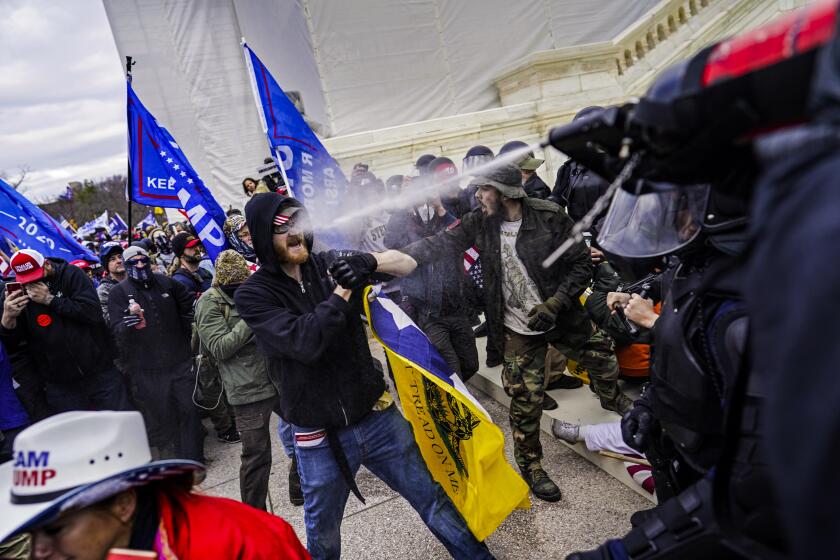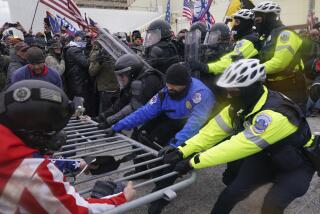After Trump clemency order, judge bars Oath Keepers founder Rhodes from entering Washington without court permission

- Share via
- President Trump supporter and founder of the far-right extremist group Oath Keepers Stewart Rhodes was freed this week from prison, where he was serving 18 years for the Capitol riot.
- Trump granted him clemency.
- Two days later, Rhodes visited the Capitol complex.
WASHINGTON — A federal judge on Friday barred Oath Keepers founder Stewart Rhodes from entering Washington, D.C., without the court’s approval after President Trump commuted the far-right extremist group leader’s 18-year prison sentence for orchestrating an attack on the U.S. Capitol four years ago.
U.S. District Judge Amit Mehta issued the order two days after Rhodes visited the Capitol, where he met with at least one lawmaker, chatted with others and defended his actions during a mob’s attack on Jan. 6, 2021. Rhodes, who had been serving an 18-year sentence, was released from a Maryland prison a day earlier.
Mehta’s order applies to seven other people who were convicted of charges in the riot that halted the certification of Joe Biden’s 2020 presidential election victory over Trump. The order also prohibits them from entering the Capitol building or surrounding grounds without the court’s permission.
The president pardoned, commuted the prison sentences of or ordered the dismissal of charges for those convicted in nearly 1,600 riot cases, including for people convicted of assaulting police officers.
Rioters who were convicted and imprisoned for their roles in the violent attack on the Capitol on Jan. 6 were being released after receiving pardons and commutations from Trump.
Rhodes was convicted of seditious conspiracy in one of the most serious cases brought by the Justice Department. He was found guilty of orchestrating a weeks-long plot that culminated in his followers attacking the U.S. Capitol in a desperate bid to keep Trump, a Republican, in power. Rhodes did not enter the building on Jan. 6.
Trump’s sweeping clemency order on Monday upended the largest prosecution in Justice Department history, freeing from prison people seen on camera viciously attacking police, as well as leaders of far-right extremist groups convicted of orchestrating violent plots to stop the peaceful transfer of power after his election loss. Trump had called Jan. 6 prisoners “patriots” and “hostages.”
Ed Martin, who has been serving as U.S. Atty. for the District of Columbia since Trump’s inauguration Monday, argued that Trump’s commutations mean Rhodes and others are no longer subject to the court’s supervision. In a court filing that bears only his name and signature, Martin urged the judge to vacate Friday’s order.
Martin has served as a board member of the Patriot Freedom Project group, which portrays the Jan. 6 defendants as victims of political persecution. He’s now overseeing the office that prosecuted the hundreds of riot defendants.
“The individuals referenced in our motion have had their sentences commuted — period, end of sentence,” Martin said in a statement Friday.
In his Wednesday visit to Capitol Hill, Rhodes met with at least one lawmaker and chatted with others. He defended his Jan. 6 actions and refused any responsibility in the violent siege.
Rhodes stopped at a Dunkin’ Donuts inside the House office building in the Capitol complex before delivering a lengthy defense of himself and his actions. He told reporters he would be pushing Trump to grant him a full pardon; he said he hoped to eventually speak with the president.
Judges in Washington’s federal court spent Wednesday dismissing a slew of cases against Jan. 6 defendants that were still pending. Several judges took the opportunity in written orders to lament the abrupt end to the prosecutions, saying Trump’s mass pardons won’t change the truth about the mob’s attack on a bastion of American democracy.
Former Proud Boys leader Enrique Tarrio and Oath Keepers founder Stewart Rhodes leave prison after Trump commuted their Jan. 6 seditious conspiracy sentences.
U.S. District Judge Colleen Kollar-Kotelly said evidence of the Jan. 6 assault on the Capitol is preserved through the “neutral lens” of riot videos, trial transcripts, jury verdicts and judicial opinions.
“Those records are immutable and represent the truth, no matter how the events of January 6 are described by those charged or their allies,” she wrote.
U.S. District Judge Tanya Chutkan, who presided over Trump’s election interference case before its dismissal, said the president’s pardons for hundreds of Jan. 6 rioters can’t change the “tragic truth” about the attack. Chutkan added that her order dismissing the case against an Illinois man who was charged with firing a gun into the air during the riot cannot “diminish the heroism of law enforcement officers” who defended the Capitol.
“It cannot whitewash the blood, feces, and terror that the mob left in its wake,” Chutkan wrote. “And it cannot repair the jagged breach in America’s sacred tradition of peacefully transitioning power.”
In Congress, several Democratic lawmakers said they were stunned by Rhodes’ arrival at the Capitol complex many had fled that day.
“Does he still constitute a threat to public safety? Does he constitute a threat to American constitutional democracy?” asked Rep. Jamie Raskin (D-Md.), who led the House’s impeachment of Trump, who was acquitted by the Senate on inciting the insurrection.
California Rep. Pete Aguilar (D-Redlands) said, “It’s new and interesting that they’re using the front door this time.”
At an emotional news conference in the Capitol, two of the police officers who fought the rioters said they are angry and exhausted but that they would continue to speak out.
Metropolitan Police Officer Daniel Hodges, who was crushed in the main center doors of the Capitol’s West Front as rioters grabbed his gas mask and tried to gouge his eyes, said he worked 12-hour shifts to protect Trump and his supporters during the inauguration. “It doesn’t matter,” Hodges said. “I’ll be there.”
More than 130 convicted rioters were awaiting sentencing when Trump issued pardons.
John Banuelos, 39, of Illinois, was awaiting trial in a Washington jail when Chutkan dismissed charges that he climbed scaffolding outside the Capitol, pulled what appeared to be a gun from his waistband and fired two shots into the air.
“In hundreds of cases like this one over the past four years, judges in this district have administered justice without fear or favor,” Chutkan wrote. “The historical record established by those proceedings must stand, unmoved by political winds, as a testament and as a warning.”
More than 1,000 of the people charged with Capitol riot-related federal crimes pleaded guilty. Approximately 250 others were convicted by a judge or jury after trials. More than 1,100 were sentenced, with more than 700 receiving a term of imprisonment ranging from several days to 22 years.
About 140 police officers were injured during the riot. At least four officers who were at the Capitol later died by suicide. And Capitol Police Officer Brian Sicknick collapsed and died after engaging with the members of the mob. A medical examiner later determined he died of natural causes. Four people among the crowd also died.
Kollar-Kotelly said the heroism of officers who defended the Capitol “also cannot be altered or ignored.”
“Grossly outnumbered, those law enforcement officers acted valiantly to protect the Members of Congress, their staff, the Vice President and his family, the integrity of the Capitol grounds, and the Capitol Building — our symbol of liberty and a symbol of democratic rule around the world,” she wrote.
Kunzelman and Richer write for the Associated Press.
More to Read
Sign up for Essential California
The most important California stories and recommendations in your inbox every morning.
You may occasionally receive promotional content from the Los Angeles Times.













